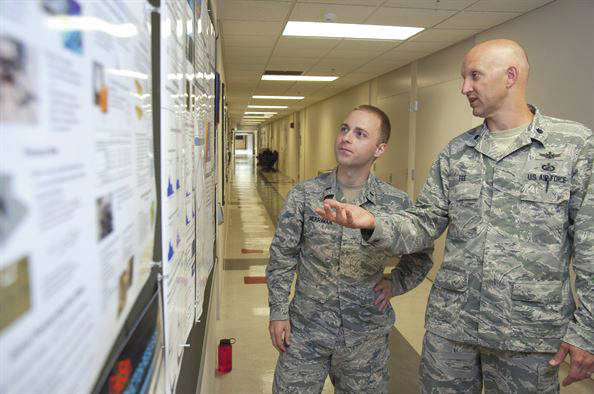
WRIGHT-PATTERSON AIR FORCE BASE — With talk of nuclear weapons returning to Americans’ everyday conversations, it might be excusable for the average person to think that the technology somehow had left the mainstream — this couldn’t be further from the truth.
For educators at the Air Force Institute of Technology, nuclear engineering has been a mainstay of their engineering physics program for more than 60 years, teaching Airmen and their joint colleagues how to deal with every aspect of nuclear weapons, from treaty monitoring and proliferation to nuclear weapon effects and how to protect against them. It’s a course of study virtually impossible to duplicate in the civilian world.
“At most universities, the nuclear engineering programs are [part of] the engineering school. And so, they’re focused on reactors,” Dr. John McClory, AFIT associate professor of nuclear engineering, said. “[At] AFIT, it’s in the engineering physics department and it’s focused on nuclear weapons. But, that’s our uniqueness. You really don’t see the close tie between applied physics and nuclear engineering like you do here in our department at the graduate level. And, you don’t see a program that’s, basically, solely focused on the Department of Defense and Department of Energy missions the way we are.”
AFIT awards nuclear engineering degrees through an 18-month master’s program and a three-year doctoral program. The programs focus on how nuclear weapons work. Students learn about nuclear weapon effects, such as blast, thermal, x-rays and electromagnetic pulse, both from the perspective of how to protect from those effects as well as how to use them to target an adversary. It also highlights the residual effects of nuclear weapons, such as how fallout works, how to simulate fallout and how to plan for it, both defensively and in targeting.
It can be an ambitious line of study, done so at an ambitious pace.
“So in three years [for a Ph.D.], it’s very, very aggressive,” Lt. Col. James Fee, AFIT assistant professor of nuclear engineering, said. “Most civilian institutions would [use] four- to five-year doctoral programs to do that. A student could get the majority of how the nuclear fission and fusion process works and how detectors work. However, a student wouldn’t get an education on nuclear weapon effects. You can’t get that in any civilian institution.”
With more and more foreign countries attempting to gain nuclear weapons of their own, perhaps taking civilian nuclear power programs and changing them to fabricate a weapon, Fee believes the need for experts in nuclear weapons will only increase.
“The demand signal will grow for nuclear engineers who have this technical expertise, who understand these issues and can give good, sound advice on, ‘Is it ok to take a risk in this area?’ or ‘What does this mean?,’” Fee said. “Nuclear weapons and nuclear engineering, in general, is very, very technical. So, unless you understand the implications, you may lose sight of what a country’s doing with their nuclear energy program. They may be making weapons on the side and telling the world, ‘Oh no, we’re just running our reactors.’ So, having experts who can answer those questions from a nuclear treaty monitoring standpoint is [critically important].”
AFIT’s faculty is dedicated to creating those experts, according to McClory.
Students are primarily early- to mid-career officers, senior noncommissioned officers and civilians from Air Force Global Strike Command and throughout the Air Force nuclear enterprise.
Bridging the communication gap between technical experts and non-technical leaders is only one benefit of an AFIT education according to Fee. He says the lessons students learn stay with them for far longer than a tour of duty.
“We force students to do a research project where they come up with the research problem. They come up with a plan on how to solve it. They work the scientific method. They develop the critical thinking skills. And, all that’s on their own, nobody is helping them,” said Fee. “That mental process of how to think through a problem and break it down into its parts and solve it shows up in our students for the rest of their career. They take [those skills] and apply it to other problems as well.”
The importance of technical expertise in the nuclear enterprise is so important that AFIT stood up a Nuclear Weapons Effects, Policy, and Proliferation Graduate Certificate program in 2012, according to McClory. The program graduates an average of 100 students annually, aimed at educating pilots, navigators, maintainers, missileers and others who may be switching from conventional arms to the nuclear enterprise, or simply those already in the nuclear enterprise yearning for professional development.
“The idea is to educate the students on nuclear weapons effects, nuclear proliferation and nuclear strategy and policy so that when they’re assigned to the nuclear enterprise, they have the knowledge necessary to develop plans, converse with nuclear weapon experts on technical issues, and make better decisions to serve the needs of the Air Force,” McClory said. “I think having personnel on staffs that have been educated in these areas will help the Air Force make better decisions and put together better plans associated with the deterrence mission.”
Students interested in pursuing a nuclear engineering degree should watch for the Air Force’s Annual Advanced Academic Degree announcement, usually released each July, and apply online. AFIT degrees are considered a competitive assignment.
Those interested in the NWEPP graduate certificate program should contact Jennifer Ngo at [email protected].


